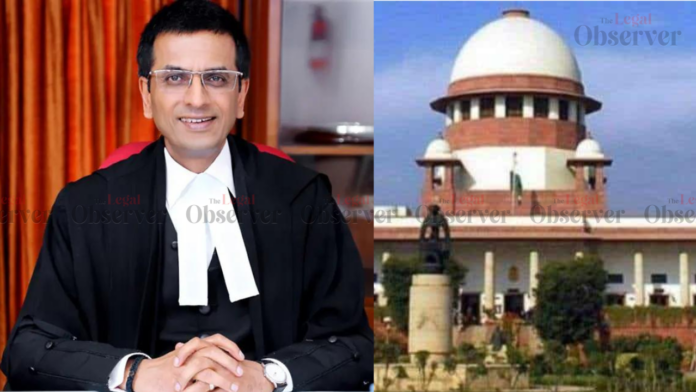Justice Chandrachud, Decriminalisation of section 377 of Indian Penal Code, Chandrachud Speech At IIT Delhi
Written and Edited by Anjani Kumar
While giving a speech in IIT Delhi , Supreme Court Justice Chandrachud recently said ” Today marks the fourth anniversary of the decision of Decriminalisation of section 377 which has enabled people to become legally empowered citizens and has guided people to come ahead while demanding their rights rightfully and proudly.”
On this occassion, he also elaborated upon making structural changes in our legal system so that we are able to extend justice to marginalised class which continue to face oppressions in our society “.
While saying that discrimination is intersectional, he gave an example of a Dalit blind woman who would surely be very different from a Dalit male student, or a non-Dalit segment of the society who is or is not visually challenged. He asserted that we are a mix of a plurality of identities. Therefore, he doesn’t think anyone of us possess any singular identity which is definitive of the life that we live.
Justice Chandrachud further said, “I must share with all of you that when I got an invitation for an inaugural talk where he read and re-read the quote. The line which is taken from Navtej case said that our Constitution above all is an essay in the acceptance of diversity. It is founded on the vision of an inclusive society which also accomodates living plural ways of life. I pondered over what it means in our educational institutions. In my understanding, what it signifies for all universities and institutes of higher education is that they must look like the India which they represent.
If IIT Delhi wants to continue to fulfill its vision of contributing to India’s growth through excellence in scientific and technical education and research of serving as a valuable resource for society, then a diverse, equitable, inclusive and accessible IIT is definitely is definitively the need of hour. He went on to say , ” As we celebrate 60 years of IIT Delhi and we also celebrate the establishment of the office of diversity and inclusion, this may be an appropriate moment to reflect all the transformative possibilities of IITs by looking at the intersection of two long-standing concerns of the state- education and social justice. He was Dr. Baba Saheb Ambedkar who gave a clarion call to educate, agitate and organise. He repeatedly emphasised on the importance of education for the emancipation of the oppressed sections of our society. He recounted Ambedkar who in his address to the constituent assembly on November 25, 1949, had recognised the thing that independent India was entering Into a life of contradictions, the functioning of higher education in India then as of now represents this contradiction between hope and disappointment, between promoting social mobility and legitimising existing inequalities in the name of credentials and degrees and merit.
While praising the work done by IIT , he said that the idea behind establishing IITs took shape in the late 1940s in the country when the Sarkar committee recommended for creation of higher technical educational institutions in the country. In 1956 , Jawaharlal Nehru while speaking at the first annual convocation of IIT Kharagpur believed the IITs to be representing India’s urges, India’s future in the making.
In 1961 , College of engineering was established and later on it was declared as an institution of national importance which is today better known as Indian Institute of technology Delhi.






